Notes
- ↑ "Badfinger Biography Pages - Without You:The Tragic Story". Archived from the original on 2007-04-05. Retrieved 2008-03-05.
Dan Matovina (born October 10, 1957) was known for his work as a recording engineer, record producer, and author of a book on Badfinger.
Matovina was born in Cleveland, Ohio. Beginning in the early 1980s, his music engineering included artists such as Pete Ham, Badfinger, New Edition, The Monkees, Manhattan Transfer, Frankie Valli, The Beach Boys, The Pandoras, Dean Ford, The Babys, James Lee Stanley, Primetime, The Long Ryders, 5 Guns West, Radio Cammon, Easter, The Rats, Derrick Anderson, Blood on the Saddle. and Jigsaw Seen.
His production work included Dean Ford, House of Freaks, Badfinger, Pete Ham The Clints, Karmann, On The Air.
In the early 1990s, Matovina began his research for his biography of the rock band Badfinger entitled Without You: The Tragic Story Of Badfinger (first published in 1997). A revised edition was made available in 2000 with a CD of rarities. In 2022, it was made available on Kindle through Amazon.com. [1]

Badfinger were a Welsh rock band formed in 1961 in Swansea. Their best-known lineup consisted of Pete Ham (guitar), Mike Gibbins (drums), Tom Evans (bass), and Joey Molland (guitar). They are recognised for their influence on the 1970s power pop genre. It is estimated that the band sold 14 million records.

No Dice is the third studio album by British rock band Badfinger, issued by Apple Records and released on 9 November 1970. Their second album under the Badfinger name, but their first official album under that name, and first to include guitarist Joey Molland, No Dice significantly expanded the British group's popularity, especially abroad. The album included both the hit single "No Matter What" and the song "Without You", which would become a big hit for Harry Nilsson, and later a hit for Mariah Carey.

Straight Up is the fourth studio album by the Welsh rock band Badfinger, released in December 1971 in the United States and February 1972 in Britain. Issued on the Beatles' Apple record label, it includes the hit singles "Day After Day" and "Baby Blue", and the similarly popular "Name of the Game", all of which were written by singer and guitarist Pete Ham. The album marked a departure from the more rock-oriented sound of Badfinger's previous releases, partly as a result of intervention by Apple Records regarding the band's musical direction.

Anthony John Selvidge, known professionally as Tony Kaye, is an English keyboardist, best known as a founding member of the progressive rock band Yes. Born into a musical family, Kaye was classically trained and intended to become a concert pianist before he developed an interest in jazz and contemporary rock and pop music. He joined several groups through the 1960s, including the Federals, Johnny Taylor's Star Combo, Jimmy Winston & His Reflections, and Bittersweet.

Peter William Ham was a Welsh singer, songwriter and guitarist best known as a lead vocalist of and composer for the 1970s rock band Badfinger, whose hit songs include "No Matter What", "Day After Day" and "Baby Blue". He also co-wrote the ballad "Without You", a worldwide number-one hit for Harry Nilsson that has become a standard covered by hundreds of artists. Ham was granted two Ivor Novello Awards related to the song in 1973.
"Without You" is a song written by Pete Ham and Tom Evans of British rock group Badfinger, and first released on their 1970 album No Dice. The power ballad has been recorded by over 180 artists, and versions released as singles by Harry Nilsson (1971), T. G. Sheppard (1983) and Mariah Carey (1994) became international best-sellers. The Nilsson version was included in 2021's Rolling Stone's 500 Greatest Songs of All Time. Paul McCartney once described it as "the killer song of all time".
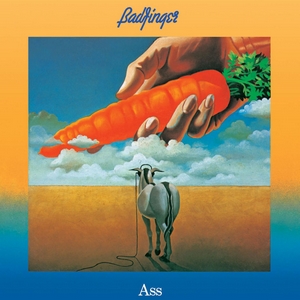
Ass is the fifth studio album by British rock band Badfinger, and their last album released on Apple Records. The opening track, "Apple of My Eye", refers to the band leaving the label to begin its new contract with Warner Bros. Records.
Stanley Herbert Polley was an American entertainment manager and fraudster active in the 1960s and 1970s. His clients included rock band Badfinger, musician Al Kooper, and singer Lou Christie. Throughout his career, Polley defrauded a number of clients and associates, most notably Badfinger.
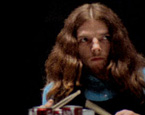
Michael George Gibbins was a Welsh musician, most notable for being the drummer of Badfinger.

Robert Jackson is an English rock musician most famous for being a member of Badfinger from 1974-75 and 1981-83, and of The Fortunes from 1995-2018. He currently tours under the name Badfinger in the United Kingdom.

Joseph Charles Molland is an English songwriter and rock guitarist whose recording career spans five decades. He is best known as a member of Badfinger, the most successful of the acts he performed with. Molland is the last surviving member from the band's classic line-up. He lives in Minneapolis, Minnesota.
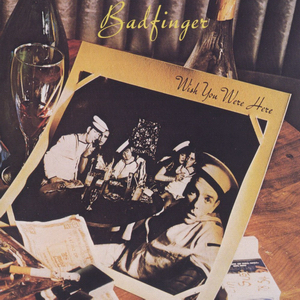
Wish You Were Here is the seventh studio album by rock band Badfinger and their third consecutive album produced by Chris Thomas. It was recorded in the spring of 1974 at Colorado's Caribou Ranch and released in November of that year on Warner Bros. Records. Wish You Were Here was the second and last album the band released on the Warner Bros. label.
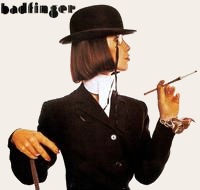
Badfinger is the sixth studio album by British rock band Badfinger. The album was recorded in autumn 1973 and released in 1974 on Warner Bros. Records. It was the first of two albums released by the band on the Warner label. The cover art for the album shows a woman wearing a riding outfit and hat from the 1920s and smoking a cigarette in a cigarette holder.
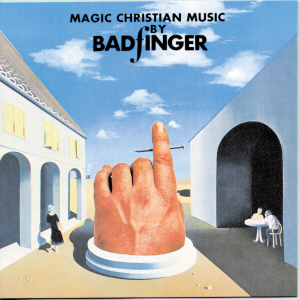
Magic Christian Music is the second studio album by the British rock band Badfinger, released on 9 January 1970 on Apple Records. It was the first release under the band's new name, Badfinger. The band had previously released the album Maybe Tomorrow in 1969 under the name The Iveys. Three tracks from the LP are featured in the film The Magic Christian, which also gives the album its title. However, Magic Christian Music is not an official soundtrack album for the film.
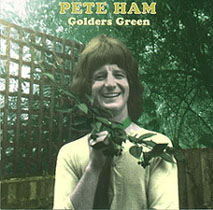
Golders Green is the second posthumous CD release of demo material recorded by Badfinger frontman Pete Ham. The recordings are taken from various eras, beginning with compositions he wrote during his years with The Iveys in 1968 and 1969, and running throughout his tenure with Badfinger, ending with his death in 1975.

Thomas Evans was an English musician. He is best known for his work as the bassist of the band Badfinger.

BBC in Concert 1972–1973 is a CD of live recordings by the British rock group Badfinger released in 1997 by Strange Fruit Records and then re-released in 2000 by Fuel 2000 Records. The recordings were made for the BBC in 1972 and 1973, in two separate concerts at the Paris Theatre in London. The album also includes a 1970 BBC recording of Badfinger's first Top 10 hit, "Come and Get It".

"Baby Blue" is a song by Welsh rock band Badfinger from their fourth studio album, Straight Up (1971). The song was written by Pete Ham, produced by Todd Rundgren, and released on Apple Records. As a single in the US in 1972, it went to #14. In 2013, the song was prominently featured in the series finale of the television show Breaking Bad. As a result, the song charted in the UK for the first time, reaching #73.

"Apple of My Eye" is a song recorded by the rock/pop band Badfinger for inclusion on their 1973 album, Ass. The song was written and sung by Pete Ham, produced by Chris Thomas and Badfinger, and released on Apple Records.
Philip McDonald is an English recording studio audio engineer, best known as the engineer for EMI and later for Apple Records during the Beatles' studio years, along with Geoff Emerick and others. McDonald joined Apple as a senior balance engineer, at the age of 25. Aside from his work on Beatles albums, he was responsible for engineering on recordings by John Lennon, George Harrison, the Shadows, Paul McCartney, Ringo Starr, Roy Harper, Badfinger, Rhead Brothers, Roger Daltrey, and Squeeze.